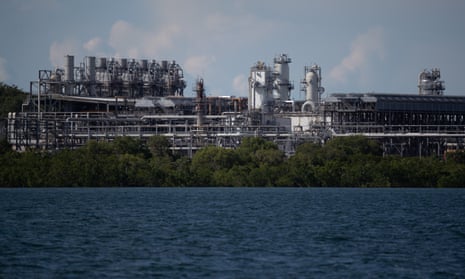Northern Territory community members say they feel “betrayed” and unheard after revelations the Fyles government quietly consulted the gas industry before walking away from a net zero emissions requirement for new onshore gas projects.
Guardian Australia revealed on Monday that the NT government abandoned a proposal to set net zero rules for direct emissions from new onshore gas projects after companies including Santos and Inpex objected, according to documents released under freedom of information.
The NT public and other key stakeholders were not consulted about the proposal.
Oli Johns is a Darwin-based teacher who led a recent letter to the chief minister, Natasha Fyles, that called on the government to reverse its stance on fracking of the Beetaloo basin and the proposed Middle Arm development in Darwin harbour.
Signed by more than 300 educators with the backing of the NT branch of the Australian Education Union, the letter requested a meeting in which teachers could discuss their concerns and their duty of care to future generations they work with. Johns said the teachers had been unable to secure a meeting.
He said correspondence showing the NT government sought the views of major gas companies about a proposal to address the key climate recommendation of a scientific inquiry into fracking – without also sharing that proposal with the community – made him “feel despairing when our own government is not representing our interests”.
“We’ve known this for a long time but today it’s made clear that [the gas industry] are the primary stakeholder,” he said.
“I can’t even say the community is the secondary stakeholder because we weren’t even on the list. There was no stakeholder after the fossil fuel industry.
“I feel bitterly disappointed and I feel betrayed and I feel not listened to.”
Louise Woodward is a leading NT paediatrician who joined doctors protesting in Canberra in August about the potential climate and health impacts of new gas projects.
“As health professionals in the NT, we feel betrayed by the NT government who do not seem to value the health and wellbeing of the people they serve,” she said.
Correspondence released to Guardian Australia shows the NT government approached gas companies in late 2022 for their feedback on a proposal to address recommendation 9.8 of the scientific inquiry into fracking.
That recommendation required the NT and federal governments to “seek to ensure” that new onshore gas projects in the NT did not cause a net increase in Australia’s greenhouse gas emissions.
Gas companies raised strong objections when the Fyles government proposed an NT-level policy that would require the direct emissions associated with gas production to be net zero from the commencement of production activities.
The proposal was subsequently dropped and it was left to the federal government and Greens to negotiate a similar policy for direct (scope 1) emissions from new gas projects under the federal safeguard mechanism in March this year.
Alice Nagy, a member of Parents for Climate in the Northern Territory, said it was “hugely concerning that our elected representatives are taking guidance from fossil fuel companies to shape important policy”.
“Our group of climate-concerned parents held protest playgroups outside Chief Minister Fyles’ office for months at the end of 2022 requesting to meet with her and were never given the opportunity,” she said.
after newsletter promotion
“Now we know at that very same time the government was engaging with gas companies as stakeholders around offset policies, our group representing NT families were shut out. It’s an absolute cop out and shows our democracy is broken.”
Carmel Flint is the national coordinator for the Lock the Gate Alliance. She said at the same time as the NT government was consulting gas companies last year, the organisation and other groups were meeting an independent adviser appointed by the government to oversee the implementation of fracking inquiry’s recommendations and “trying to get information on how the greenhouse gas recommendations would be implemented”.
“We were never even informed that this emissions proposal existed,” she said.
“These documents provide a devastating glance behind the curtain into how vested fossil fuel interests and weak governments are circumventing the urgent action that is needed on climate change.”
A spokesperson for the NT government said “as we move to a net-zero world, the territory Labor government’s No 1 priority is creating opportunities for Territorians”.
“The territory government manage natural gas extraction in line with the final report handed down this year. We have a strengthened regulatory framework, ensuring greater transparency and accountability,” they said.
“This means all applications made for gas production in the Beetaloo sub-basin – subject to the industry’s successful exploration and appraisal results – will go through a rigorous approval and monitoring process.”
In an earlier statement, the government said “it would be misleading to suggest that a single viewpoint was considered in the development of the NT’s policy on the management of greenhouse gas emissions from the onshore gas industry”.
“The minister consulted with industry to inform the NT government’s policy position.”
The spokesperson said the former environment and climate change minister had considered the views of other stakeholders, including land councils and environment groups. They said these views were “were well documented and known through recent consultation on other policies” including a policy for new and expanding large emitters and a policy on carbon offsets for greenhouse gas emissions.
